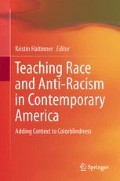Abstract
Love it or hate it, the major motion picture Crash is discussed as a tool to teach a sociological perspective of racism. Using multiple examples from the film, the paper focuses on seeing the sociological in personal practices of everyday life. Similarly, analyzing individual experiences and expressions of racism for institutional contexts provides insights into systemic inequalities and thus, allows us the ability to analyze solutions to them. The author argues that using the film provides an opportunity to expose institutional racism if read with a sociological imagination. Moreover, the paper suggests that it is imperative to see, and to teach our students to see, institutional racism not as something out there beyond the everyday interpersonal interactions of everyday life, but as represented in the micro interactions of daily life.
Access this chapter
Tax calculation will be finalised at checkout
Purchases are for personal use only
References
Barndt, J. (2007). Understanding & dismantling racism: The twenty-first century challenge to White America. Minneapolis: Fortress Press.
Bonilla-Silva, E. (2010). Racism without racists: Color blind racism and racial equality in contemporary America (3rd ed.). Lanham: Rowman & Littlefield.
Desmond, M., & Emirbayer, M. (2010). Racial domination, racial progress: The sociology of race in America. New York: McGraw Hill.
Feagin, J. R. (2006). Systemic racism: A theory of oppression. New York: Routledge.
Giroux, S. S., & Giroux, H. A. (2010). Don’t worry we are all racists: Crash and the politics of privatization. In J. Sutherland & K. Feltey (Eds.), Cinematic sociology: Social life in film. Los Angeles: Pine Forge Press.
Jensen, R., & Wosnitzer, R. (2007). Crash and the self-indulgence of White America. In M. Benitez Jr. & F. Gustin (Eds.), Crash course: Reflections on the film crash for critical dialogues about race, power and privilege. Emeryville: Institute for Democratic Education and Culture-Speak Out.
Jolivette, A. (2007). Crash: An indigenous centered approach to healing the soul wound. In M. Benitez Jr. & F. Gustin (Eds.), Crash course: Reflections on the film crash for critical dialogues about race, power and privilege. Emeryville: Institute for Democratic Education and Culture-Speak Out.
Kitwana, B. (2002). The hip hop generation: Young blacks and the crisis in African American culture. New York: Basic Civitas Books.
McIntosh, P. (1988). White privilege: Unpacking the invisible knapsack. Working paper. Wellesley College Center for Research on Women, Wellesley.
Mead, G. H. (1934). Mind, self and society. Chicago: University of Chicago Press.
Ohlin, A., & Smith, A. (2007). How to read a film: Looking at Crash. In M. Benitez Jr. & F. Gustin (Eds.), Crash course: Reflections on the film crash for critical dialogues about race, power and privilege. Emeryville: Institute for Democratic Education and Culture-Speak Out.
Pharr, S. (1988). Homophobia: A weapon of sexism. Little Rock: Chardon Press/Women’s Rights Project.
Rhee, M. (2007). ‘Chink’, ‘chinaman’, and ‘celestial’: Inhumanity in Crash. In M. Benitez Jr. & F. Gustin (Eds.), Crash course: Reflections on the film crash for critical dialogues about race, power and privilege. Emeryville: Institute for Democratic Education and Culture-Speak Out.
Sutherland, J., & Feltey, K. (2010). Cinematic sociology: Social life in film. Los Angeles: Pine Forge Press.
Wise, T. (2007). More of a thud really: Racism, Crash and the reinforcing of White Denial. In M. Benitez Jr. & F. Gustin (Eds.), Crash course: Reflections on the film crash for critical dialogues about race, power and privilege. Emeryville: Institute for Democratic Education and Culture-Speak Out.
Author information
Authors and Affiliations
Corresponding author
Editor information
Editors and Affiliations
Rights and permissions
Copyright information
© 2014 Springer Science+Business Media Dordrecht
About this chapter
Cite this chapter
Kunkel, C.A. (2014). Lessons from Crash . In: Haltinner, K. (eds) Teaching Race and Anti-Racism in Contemporary America. Springer, Dordrecht. https://doi.org/10.1007/978-94-007-7101-7_20
Download citation
DOI: https://doi.org/10.1007/978-94-007-7101-7_20
Published:
Publisher Name: Springer, Dordrecht
Print ISBN: 978-94-007-7100-0
Online ISBN: 978-94-007-7101-7
eBook Packages: Humanities, Social Sciences and LawSocial Sciences (R0)

